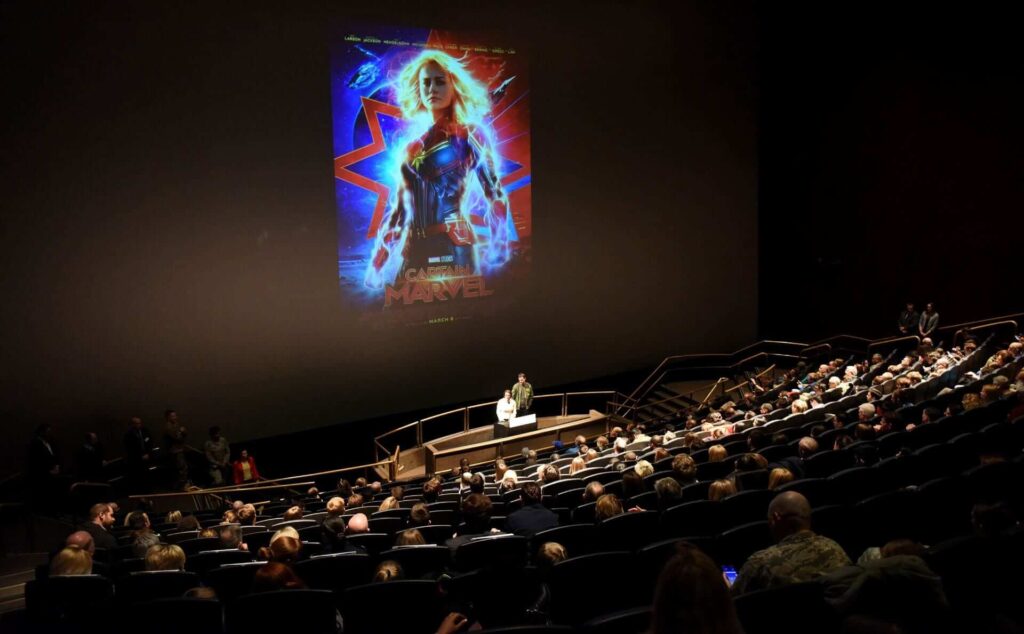by The Cowl Editor on March 21, 2019
Opinion

by Julia McCoy ’22
Opinion Staff
In its over 10 year run of hit blockbuster films, Marvel Studios had not released a female-led superhero movie until the premiere of Captain Marvel this March. This monumental moment has set a new tone for the production studio and will likely bring serious change, as it marks an important movement for society, particularly women.
Marvel, as a whole, has included women in leading roles in their films for many years now, including Scarlett Johansson as Black Widow, who has appeared in nine films to date. The company, however, produced only male-led films for the first 10 years of its prolific tenure.
Captain Marvel, starring Academy Award winning actress Brie Larson, was the best choice for Marvel’s first female-led superhero film. Her storyline not only fits perfectly into Marvel’s current timeline, which is gearing up for another big release with the final Avengers film in April, but it also introduces and highlights a strong female character in more detail than we have seen before.
Captain Marvel’s best friend and copilot in the film is also a woman. The role she plays, though not the lead, is important as well. Lashana Lynch plays Maria Rambeau, a single mother and retired Air Force pilot who takes care of her daughter while agreeing to help Captain Marvel.
Rambeau is an integral character in the film, not only for the role that she plays, but also for the significance of her character. Portraying a powerful single mother in a film is not done often and this role can resonate with so many women across the world, empowering them as women who can do whatever they want.
What is truly spectacular about this film is that it does not focus on the female aspect of the story. There is no particular need to emphasize the challenges that Captain Marvel faces because she is a female. What the film seems to portray instead is the undeniable strength shown by this new hero.
The lack of attention regarding her gender influences young viewers immensely. Instead of having to say that women are equal to men, or for her to have to fight for equality, Captain Marvel simply displays her power in a confident way that implies all of those things.
Many young women in particular are taking this movie to be a mantra for their lives. Seeing a woman doing what only men have done before is empowering. A similar phenomenon emerged after the release of DC Comics’ Wonder Woman in 2017.
It is gratifying to see the influence of movies such as these, and this positive outlook will hopefully continue in future films.
As with so many films, of course, there was some backlash when it came to reviews. An outbreak of internet trolls posted a plethora of negative reviews on the popular website Rotten Tomatoes; the film received a score of 33 percent from regular audience viewers as compared to an 81 percent critic score.
Upon further review, it appears as though the negative reviews came from accounts who posted scathing reviews of other female-led films such as Ghostbusters (2016) and Ocean’s 8 (2018). In addition, many male Marvel fans were reported to have negatively reviewed the film before it was released, due to an animosity for a female-led film and for Larson’s remarks about wanting a more inclusive press.
Whatever the case, the movie is a smashing success in the box office, as it has made $600 million worldwide in just over a week.
The impact of this movie is possibly more significant than the movie itself. It sets a precedent for the inclusion of strong women in future films and for an increased significance of their roles in group films, such as Avengers: Endgame.
Captain Marvel is a film that will continue to teach young women that they are just as powerful as men, and that their stories can be told in the same way. There does not have to be a distinction between the way a male superhero and a female superhero tells his or her story. Everyone can be powerful.just as powerful as men, and that their stories can be told in the same way. There does not have to be a distinction between the way a male superhero and a female superhero tells his or her story.
Everyone can be powerful.